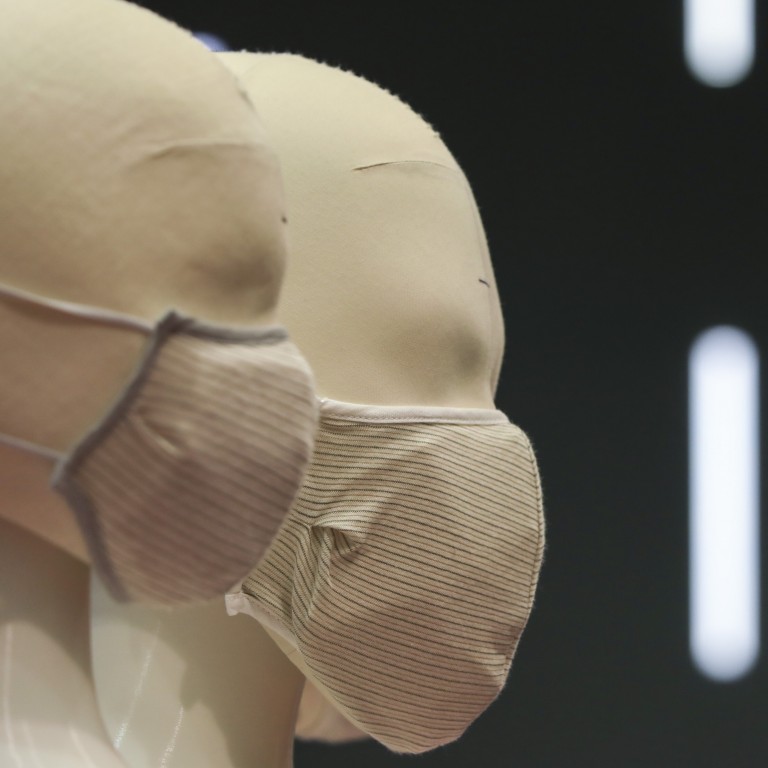
Coronavirus: Hong Kong residents to begin receiving reusable masks from Monday
- Scheme embroiled in controversy after the government refused to tender the contract and links later revealed between developer and manufacturers
- Hongkong Post will deliver the masks to 2.78 million locals who have already signed up to the programme
Free reusable masks will be sent out to Hongkongers starting on Monday under a scheme that has proven a public relations headache for the government.
Under the plan, every resident is eligible to receive the masks which can be used up to 60 times. But the roll-out has been anything but smooth for the administration, after links were revealed between the mask designer, a government-funded non-governmental organisation, and some of the manufacturers.
Hongkong Post said it would only notify applicants using SMS and the messages would not ask for any personal information. Each household will also receive a pack of 10 disposable masks in the weeks to come.
The reusable masks incorporate copper, which has antimicrobial properties, and adopt the chemical symbol of the metal in the name, CuMask+. They were designed by the Hong Kong Research Institute of Textiles and Apparel and cost about HK$40 (US$5) each.
In seeking manufacturers, the government decided against launching a public tender and initially refused to name the companies it chose. But officials eventually relented to mounting public pressure, and identified the producers, some of which had ties to the institute.
A company supplying raw materials, Esquel Group, confirmed its vice-chairwoman Teresa Yang was chairwoman of the NGO. Yang made a declaration to its board about Esquel’s involvement in February, and neither the company nor the chairwoman was involved in the “discussion process of the development, materials supply and production” of reusable masks, the company said in a statement on Saturday night.
Explaining its decision, the company said that during the procurement process, the institute contacted the sales department and “expressed extreme difficulty in securing raw materials”.
Esquel supplied 450,000 yards of the innermost cotton fabric at cost, the company said, putting the price at HK$3.8 million (US$490,000).
Lessons to learn from Hong Kong’s great mask giveaway
The company that was awarded the contract to manufacture the masks, Crystal International Group, confirmed its executive director Wong Chi-fai was a director of the institute, and he disclosed his interest to the NGO in February, according to the company. Crystal International rescheduled its existing orders and reserved considerable resources to make the reusable masks at its Vietnam facilities, it said.
The head of a company responsible for sterilising the masks said the controversy surrounding the scheme was not surprising. “Everything has two sides,” said Ronna Chao Wei-ting, the chairwoman of Novetex. Her factory had set aside existing orders to handle the government’s masks and the company would not make a profit off them.
While every Hongkonger is eligible for the masks, the required cleaning might pose a challenge to elderly people suffering chronic illnesses. The Hong Kong Public Doctors Association, with 6,000 members, asked operators of care homes to avoid having their residents use them. Nor should patients or visitors use them when in hospitals or at outpatient clinics.
Reusable masks from Hong Kong government can filter bacteria, fungi and viruses
“Most of the older adults living in [residential care homes] have chronic illnesses that require them to visit or stay at hospitals and clinics frequently,” the association said. “In addition to the tight manpower situation in [residential care homes], it is impossible to help all residents to clear their masks properly and thoroughly every day.”
The association said it had asked the Hospital Authority whether it would require patients or visitors to wear surgical masks instead and if they would be provided.
The association also wrote to the Social Welfare Department asking whether it had provided guidance to residential care home operators on the proper use of the protective item.
As the administration tries to get past the public relations difficulties, the Food and Environmental Hygiene Department has run into its own problems over face protection available for street cleaners.
A labour union said some government-employed cleaners complained their supervisors would not allow them to accept free masks from any group because doing so could flout the anti-corruption law.
Civil servant in charge of giveaway admits transparency shortcomings
“It’s outrageous,” said Li Mei-siu, vice-chairwoman of the department’s Staff Rights Union. “Why does the … department think there is a transfer of benefits when Hongkongers like me want to show some appreciation to the street cleaners?”
Li called the department’s welfare division and was told the free masks could be considered a transfer of interests. “It’s disrespectful to the cleaners who need the masks,” she said. The government gives the cleaners 50 masks a month but that was not enough because they got wet after 10 hours of use in the warm weather, Li said.
A department spokesman said workers had enough masks but could ask for more if needed.
While grateful to anyone who wanted to give the cleaners free masks, others needed them more, the spokesman said.
Additional reporting by Denise Tsang
Help us understand what you are interested in so that we can improve SCMP and provide a better experience for you. We would like to invite you to take this five-minute survey on how you engage with SCMP and the news.

